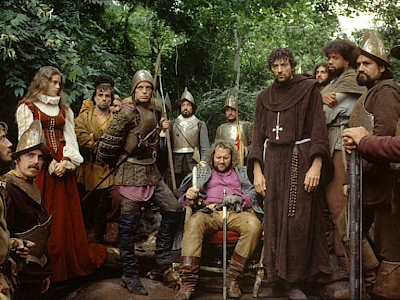Aguirre, the
Wrath of God
A film by
Werner Herzog
Year:1973
Country: Peru
German with
English subtitles
Runtime:95
minutes
17th
June 2012; 5.45 pm
Perks Mini
Theater
On this river God never finished his creation.
The captured Indian speaks solemnly to the last remnants of a Spanish expedition seeking the fabled El Dorado, the city of gold. A padre hands him a Bible, “the word of God.'' He holds it to his ear but can hear nothing. Around his neck hangs a golden bauble. The Spanish rip it from him and hold it before their eyes, mesmerized by the hope that now, finally, at last, El Dorado must be at hand. “Where is the city?'' they cry at the Indian, using their slave as an interpreter. He waves his hand vaguely at the river. It is further. Always further.
Werner Herzog's “Aguirre, the Wrath of God'' is one of the great haunting visions of the cinema. To watch "Aguirre: Wrath of God" is to encounter one of those rare films that sits with you long after you've finished watching it. The powerful and near demonic screen presence of Klaus Kinski, combined with the very real danger of the nature that surrounds him and Herzog's gift for making every shot count, is quite remarkable.
Kinski is Aguirre and it is hard to imagine better casting. He is part of an expedition of conquistadors, sent to find the fabled El Dorado, the city of gold. When the going becomes too tough for the leader Ursua, he overthrows him and leads his men on an odyssey to hell. His rousing call that "Fortune smiles on the brave and spits on the coward" is the last comfort that he can offer as the uncharted jungle territory claims its victims.
Much of the adventure takes place on rafts as Kinski urges and pummels his men to their destiny. The Peruvian river settings are in truth deadly dangerous, and Herzog expertly captures the immense power of nature against man. It is to Kinski's credit then that he is able to produce a performance of such invincible intensity. And while he stands firm, the madness around him grows as the other men are picked off one by one by the seemingly invisible Indians that hide on the jungle banks.
Despite the haunting and hypnotic power of the film, it runs at only 95 minutes. Herzog doesn't indulge himself despite the tempting locations and cast. The pace is fast and the destructive and ominous theme of power confused with madness, strong and powerful. But while it is over quite quickly, the film sits with you far beyond the running time.
- From Roger Ebert and BBC reviews
Werner
Herzog
One of the most influential
filmmakers in German Cinema and one of the most extreme personalities in film
per se, larger-than-life Werner Herzog quickly gained recognition not only for
creating some of the most fantastic narratives in the history of the medium,
but for pushing himself and his crew to absurd and unprecedented lengths, again
and again, in order to achieve the effects he demanded.
Werner Herzog (Werner
Stipetic) was born Sept. 5, 1942 in Munich. He grew up on a farm in the Bavarian
mountains. After his parents' divorce, Herzog and his mother moved to Munich
where he attended High School (graduated in 1961). He travelled through
Jugoslavia and Greece, worked in Manchester and - fact or fiction? - as a rodeo
rider.
In 1974, he walked from
Munich to Paris to see the sick Lotte Eisner. He wrote a dairy about his
pilgrimage entitled Vom Gehen im Eis (Walking on Ice) for which he received a
literary award (Rausirer Literaturpreis) in 1979. He said that when he was 14
years old, he knew that he would be making films. His first short was completed
in 1962 (Herakles) and one year later he founded his own production company.
Herzog studied history,
literature and drama in Munich and Pittsburgh (Fulbright) but not for very
long. He never attended a film school and had no formal film education. 1964 he
won the Carl Mayer Prize for the screenplay that was to become his first
feature film, Signs of Life (Lebenszeichen), which was financed by the
Kuratorium Junger Deutscher Film (300.000DM) and won the Bundesfilmpreis for
best first feature.
Among Herzog's most popular
films, though not an immediate success, was Aguirre: The Wrath of God (1972)
with Klaus Kinski, who also starred in Nosferatu (1979),Woyzeck (1979),
Fitzcarraldo (1982), and Cobra Verde (1987). One of his biggest successes was
Every Man for Himself and God Against All / The Mystery (Enigma) of Kaspar
Hauser (1974), which won the Special Award in Cannes (1975) and several Federal
Film Prizes (1975).
Herzog is famous for dealing
with marginalized figures and for his choice of 'exotic' sets (Peru, Brazil,
Australia). Herzog, the "visionary" of the NGC, insists that
"film is not the art of scholars, but of illiterates."
In recent years, Herzog
released a number of documentaries and directed various operas. His latest
feature film is Invincible. He lives in Munich and Los Angeles.









No comments:
Post a Comment